THB #93: The Batman (no spoilers)
| March 6, 2022
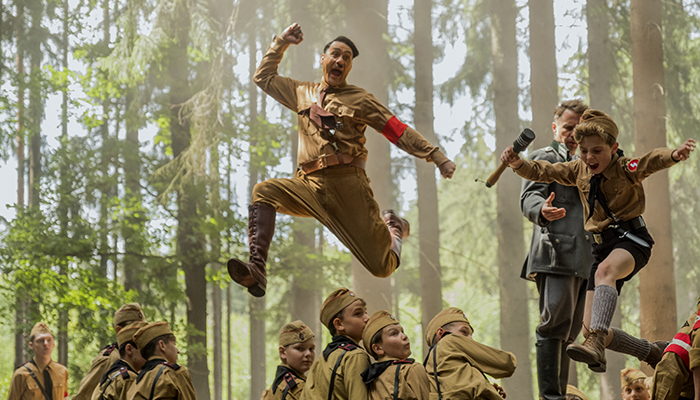
I have been sitting on this for a while. First, because MCN was in the midst of being rebuilt and I wasn’t writing formally when I first saw Jojo Rabbit. Then because I was so incensed about the attacks on the film that I didn’t want to mix the sweet and the rancid. (I will fail to fully separate them here. Apologies.)
Taika Waititi, in adapting a not-funny book about The Nazi Era, Christine Leunens’ “Caging Skies,” makes a remarkably universal film by setting the coming-of=age story amidst one of the least universal moments in world history.
There is no gray for most people when it comes to Nazi Germany. It is remembered as the singular definition of the evil of which humans are capable. As a result, even normally sophisticated thinkers, Jewish and not, have a tendency to throw up an emotional wall when any conversation about the Nazis takes any kind of turn that is less than traditional. I would argue that those viewers, no matter how much I otherwise admire them, exit the experience of Jojo Rabbit within the first three minutes and never come back, judging the film at every turn with the attitude that the film needs to prove them wrong.
This circumstance is not singular. The most famous example of this way of seeing a unique situation is surely older than the story of Jesus and those who feared him. The more modern version would be Lenny Bruce. And the less violent — and eventually overcome — version would be Richard Pryor, whose use of dirty words and slurs kept a lot of people from hearing what he was saying with his stand-up.
Ironically, another film this year, Dolemite Is My Name, has become beloved even in the face of the film’s nonstop parade of untouchable ethnic stereotypes, gender mocking, weight shaming, and use of language. I attribute this to a warm spot by critics for the Blaxploitation era and the love of artistic endeavor that is so beautifully reflected in the work of writers Larry Karaszewski and Scott Alexander, similarly reflected in their beloved Ed Wood and Man on The Moon screenplays.
Jojo Rabbit is a coming-of-age film. A 10-year-old boy, Johannes “Jojo” Betzler, is being raised by his mother, solo, in Berlin, near what we will find is the end of the war. And he has embraced the social media of its time in Germany, The Nazi Party. His mother, who questions the dogma in Germany from her first lines in the film, allows him to indulge in this because she feels it keeps him (and her… and others) safer than engaging him in pushback.
It’s easy to imagine the dramatic version of this story. But this is a Taika Waititi film, not the sad, solemn Holocaust drama we have seen literally dozens of times. Instead of delivering the adult perspective on the horrors of the moment, Waititi tells the story from the perspective of a 10-year-old.
What does a 10-year-old want? As the parent of one (he turns 10 in 24 days from this writing), I can tell you, it’s not a deep dive into the politics of the moment. My son sees Trump as a comic-book villain, which conveniently is more true of this scoundrel than most. But he lives in the world of comic characters in his iPad or PS4, smashing and killing and destroying their way to success. He also builds new worlds in Minecraft and dislikes Fortnight… so I can sleep.
In a lovely DP/30 sit with Matthias Schoenaerts a few days ago, he talked about being a kid and just needing to put on a hat, spurring an entire day of adventure to come out of his imagination, playing with his friends. Jojo does just that… but with a full Deutsches Jungvolk Hitler Youth uniform. And part of his imagination is Hitler himself… a clearly imaginary and absurdly childish Hitler, no different than the cops, robbers, cowboys, Indians (not Native Americans, but the imaginary idea of ndians who fought with cowboys), Elsa and Anna, Luke and Anakin, etc, etc, etc.
People who are enraged by this film argue that Waititi is offering up a hipster joke that makes people feel smart for laughing, thinking they are superior for getting the inside joke. But it is quite the opposite. Waititi is a sophisticated writer and director, but his humor is as simple as silent movie comedies. He loves characters we see as sophisticates being pratfall-silly.
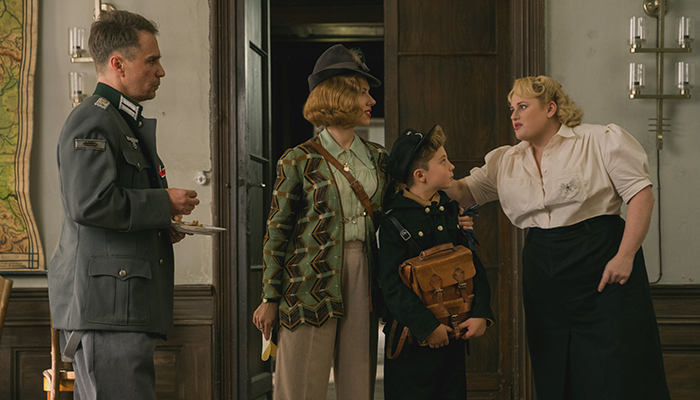
The first big sequence after the opening and credits has Jojo at the Hitler Youth camp, where the now-one-working-eyed Captain Klenzendorf (Sam Rockwell) tries to express his masculinity doing trick shots with his rifle, endlessly frustrated by not being on the front lines of the war.
This is followed by an extended montage that reminds us how stupid it is to arm a bunch of little kids, even with a knife. We also get repeated references to how devalued women were inside the Reich as anything other than being of service to the men.
Jojo and his friend Yorki discuss killing Jews in their tent as they settle down for sleep. Jojo would kill one “like that,” but he hasn’t yet mastered snapping his fingers, so he puts down his knife and claps his hands together to make a similar noise. He is a child, seeking approval.
The next day, Jojo is challenged to show his machismo by killing a rabbit. And just can’t bring himself to do it. That is when he gets his unkind nickname, with teenagers saying, “Kill, kill, kill…” over and over like kids playing spin the bottle and encouraging a first kiss between other kids.
The sequence ends with Jojo trying to regain his status by being overly enthusiastic and hurting himself seriously. Klenzendorf notes, “Don’t do that.”
I’m not going to recount the entire film in this detail. But my point in telling this much is to note that this is not some tricky piece of filmmaking. It wears its heart, its ideas, and its humor on its sleeve.
The film’s execution is sophisticated, as required by challenging the audience with this setting. And it is a challenge. But the film could easily be set in the Alabama of this minute with a kid who is MAGA-ed out, trying to fit in to the culture around him, with weapons and biases blazing. I am not offering a direct comparison between Trump and Hitler because that is absurd… Hitler had focus and the wherewithal to write a book without a ghost writer. (Ha.) But sub in an imaginary Trump for an imaginary Hitler and modern America for 1945 Germany and the story doesn’t change much at all.
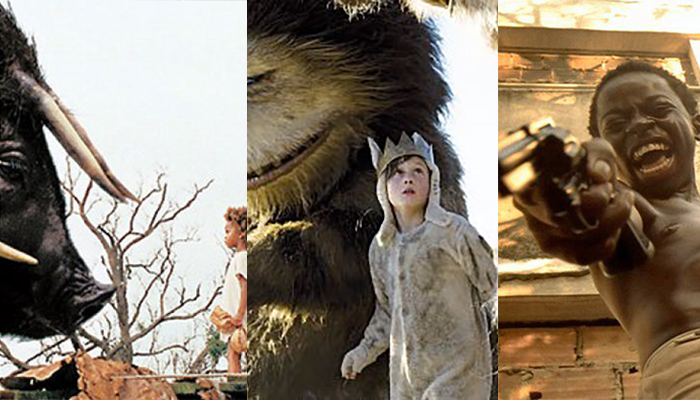
One stroke of Waititi’s genius in adapting this book is that every 10-year-old in every era is similar. He didn’t make a movie about Trump. He made a movie that connects to so many movies about kids that don’t conform to adult ideas about kids. City of God/Cidade de Deus is, at its core, a movie about children (and other under 25s) adapting to living in a horror show they can’t control and trying to make the best of it. “Lord of the Flies,” which has never had a great film adaptation, is clearly using the metaphor of youth to discuss the darkness in all humanity, as “Animal Farm” (also without a great film adaptation) does with animals. In more recent memory, Beasts of the Southern Wild takes Hushpuppy on a metaphoric journey, War Horse lost some of its mojo when the horses became literal instead of being puppets on a stage, and Spike Jonze turned Where The Wild Things Are into a story of divorce.
The second act of Jojo Rabbit brings drama into the story, striding along with the comedy. It arrives in the form of Jojo’s mother and the young Jewess who is hidden in the walls of his dead sister’s bedroom. Like a 10-year-old, Jojo reacts to the Jewess without really thinking about what it means about his mother. And even when he feels he has to keep the secret about finding the girl from his mother, his anger at his mother manifests itself the way a child’s does, selfishly and narrowly.
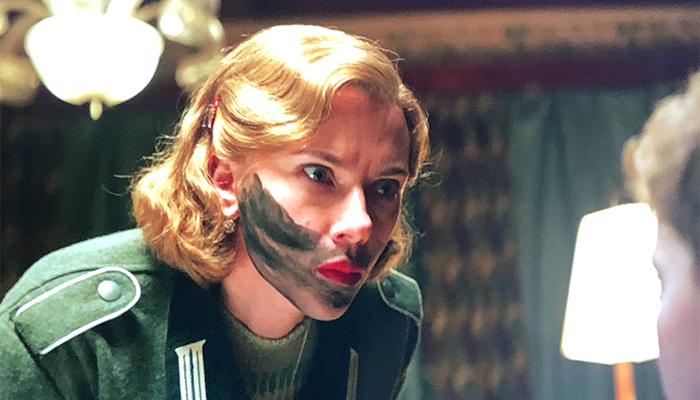
Scarlett Johansson delivers what I consider to be one of the great moments of the year in cinema, bringing her missing husband to life in herself after being challenged by her son, enraged in a male way, then resetting and reminding herself and her child how deep their bond is. It is a moment unique to the film and universal in the idea of all single parenthood, especially as lived by women in this culture. Still. It is a sequence that I believe deserves the Oscar for Supporting Actress this year, even amongst some other great performances.
And a theme that is at the center of the film is uttered for the first time. Doing what he/they/we can.
Jojo is reborn in this moment, heading in a new direction of which he is not even aware. He continues to live as though everything is the same, but his heart opens, even as he spews up propaganda that he doesn’t quite believe anymore. The love of his mother starts to move him towards his premature maturity as a boy. And that love starts to distance Hitler from his “best friend,” imaginary Hitler, who acts and sounds more and more like Hitler as the movie progresses.
Remarkably, the last hour of the movie is mostly drama with a few moments of inspired lunacy and/or silliness. I have to admit, I didn’t realize the degree of the change of tone until watching the film a third time. The moment of highest drama comes with half an hour to go in the running time.
Of course, by then, those who are not accepting the film have left the auditorium emotionally and intellectually. Their loss.
The second time Jojo feels challenged to kill and fails to do so is the moment he becomes a man. It is a deeply sad and profound moment. Our little Jojo has experienced his first great loss. He has joined the world around him. The second act ends with what I think is an homage — intended or not — to Fight Club, and by extension, The Graduate. He can see the madness. He knows the danger. And he chooses to live.
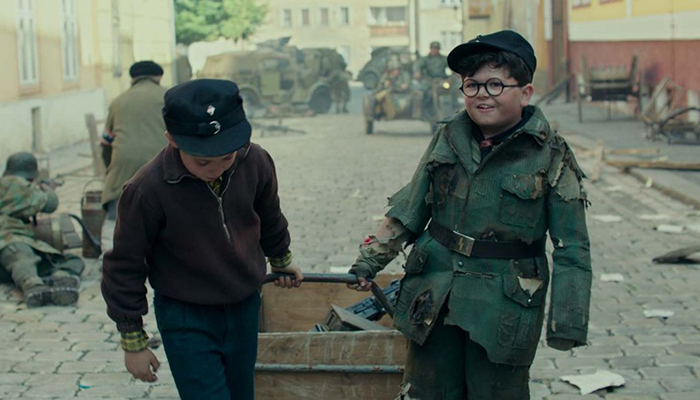
And now, a moment of love for Yorki. He is, in many ways, the “magical negro” of this movie. Wise, truth-telling, kind, insightful, unreal. The device is well worn and should really be left on the shelf 9 out of 10 times. But here, embodied by a child and therefore highly ironic, it works. The writing of this character and the performance by young Archie Yates is a thing of great beauty and magic.
The Battle of Berlin, for Jojo, ends with him seeing the reality of war and experiencing the end of the silly characters who we laughed at in the first act. Klenzendorf, knowing his end is likely near, exposes himself completely as a human. In that moment, we see what happens when the false reality of a movement — any movement — and mindless participation for whatever purposes is shaken free of by an adult.
In the end, Jojo is still not quite whole, as shown in a lie. It’s a lie of holding on to something he knows is over. But he can’t let go, as so many can’t let go.
And then he does.
And we express the ultimate freedom. We dance.
Let everything happen to you
Rainer Maria Rilke
Beauty and terror
Just keep going.
No feeling is final.

-30-
May 1, 2022

"Netflix, the great disrupter whose algorithms and direct-to-consumer platform have forced powerful media incumbents to rethink their economic models, now seems to need a big strategy change itself. It got me thinking about the simple idea that my film and TV production company Blumhouse is built on: If you give artists a lot of creative freedom and a little money upfront but a big stake in the movie’s or TV show’s commercial success, more often than not the result will be both commercial (the filmmakers are incentivized to make films that will resonate with audiences) and artistically interesting (creative freedom!). This approach has yielded movies as varied as Get Out (made for $4.5 million, with worldwide box office receipts of more than $250 million), Whiplash (made for $3.3 million, winner of three Academy Awards), The Invisible Man (made for $7 million, earned more than $140 million) and Paranormal Activity (made for $15,000, grossed more than $190 million).From the beginning, the most important strategy I used to persuade artists to work with me was to make radically transparent deals: We usually paid the artists (“participants” in Hollywood lingo) the absolute minimum allowable by union contracts upfront, with the promise of healthy bonuses based on actual box office results—instead of the opaque 'percentage points' that artists are usually offered. Anyone can see box office results immediately, so creators don’t quarrel with the payouts. In fact, when it comes time for an artist to collect a bonus based on box office receipts, I email a video clip of myself dropping the check off at FedEx to the recipient."
Jason Blum Sees Room For "Scrappier" Netflix
| April 30, 2022

"As a critic Gavin was entertaining, wry, questioning, sensitive, perceptive"
Critic-Filmmaker Gavin Millar Was 84; Films Include Cream In My Coffee, Dreamchild
April 29, 2022

| January 24, 2022
DP/30 Audio: Bombshell, Jay Roach
| December 13, 2019
DP/30 Audio: The Last Black Man in San Francisco, Jonathan Majors
| December 4, 2019
DP/30 Audio: The Mustang, Laure de Clermont-Tonnerre
| December 4, 2019
No Responses to “The Genius of Jojo Rabbit”